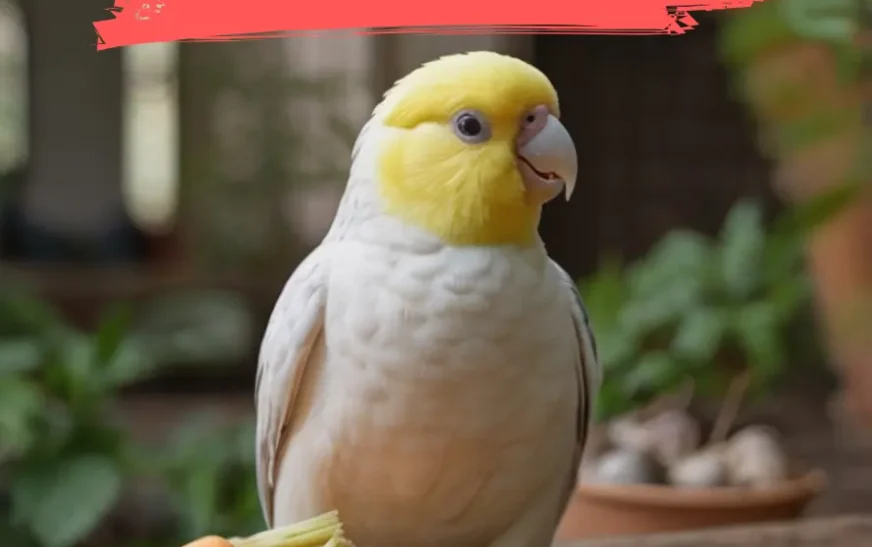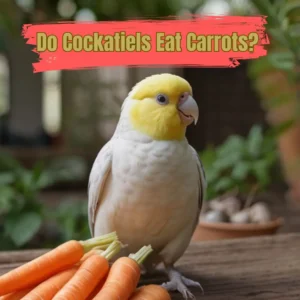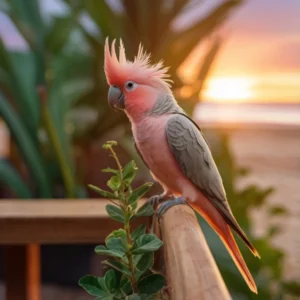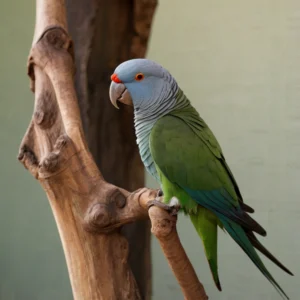Table of Contents
1. Introduction to Cockatiels and Their Diet
Do Cockatiels Eat Carrots? Everything You Need to Know Cockatiels are beloved pets known for their vibrant personalities and curious nature. A healthy diet plays a critical role in their overall well-being, consisting primarily of seeds, pellets, fruits, and vegetables. Adding fresh vegetables to their diet ensures they receive essential vitamins and minerals that enhance their feather quality, energy levels, and immune system. But not every vegetable is safe for cockatiels, so it’s crucial to know which ones are beneficial. This post explores whether cockatiels can eat carrots and discusses other vegetable options to help you create a balanced diet for your feathered friend.
2. Can Cockatiels Safely Eat Carrots?
Yes, cockatiels can eat carrots! Carrots are a safe, healthy snack for these small birds. Their crunchy texture is great for beak health, and many cockatiels enjoy the natural sweetness of this vegetable. However, you should always wash the carrots thoroughly and chop them into small pieces to prevent choking. Cooked carrots are another safe option if they are soft and unsalted. Remember to serve carrots in moderation, as they are high in natural sugars. Regularly rotating vegetables in their diet ensures they get varied nutrients.
3. Nutritional Benefits of Carrots for Cockatiels

Carrots are packed with nutrients that benefit cockatiels. They are an excellent source of Vitamin A, which supports eye health, bright feathers, and a robust immune system. Carrots also provide antioxidants that protect cockatiels from cellular damage and improve their overall vitality. Including carrots as part of a balanced diet promotes longevity and happiness in your pet bird. Just ensure carrots are not the sole vegetable offered; variety is key to a well-rounded diet.
4. How to Prepare Carrots for Your Cockatiel
Proper preparation is vital when feeding carrots to your cockatiel. Start by washing them thoroughly to remove pesticides and dirt. Peel the outer layer if needed, then chop the carrot into small, bite-sized pieces. For variety, you can grate raw carrots or steam them until soft. Avoid seasoning or adding oils, as plain carrots are best for birds. Offering carrots in different textures keeps your cockatiel interested and prevents picky eating habits.
5. Should Carrots Be a Daily Food for Cockatiels?
While carrots are healthy, they should not be a daily food for cockatiels. Overfeeding any one type of food can lead to nutritional imbalances. It’s best to serve carrots 2-3 times a week as part of a varied diet. This allows your bird to enjoy the benefits of carrots while still getting nutrients from other foods. Always monitor your cockatiel’s weight and overall health to adjust their diet if necessary. Watch How Cockatiel eat carrot on YouTube
6. Spinach: Another Vegetable Option for Cockatiels

Spinach is another excellent vegetable for cockatiels, offering a boost of iron and calcium. However, it should be fed in moderation due to its oxalate content, which can interfere with calcium absorption if overfed. Serve spinach fresh, washed, and chopped into manageable pieces. Avoid cooked or canned spinach, as these can contain harmful additives. Including spinach occasionally ensures your cockatiel gets a nutrient boost without risks.
7. Zucchini: A Healthy Treat for Cockatiels

Zucchini is a hydrating and nutritious vegetable that cockatiels enjoy. It’s rich in vitamins like Vitamin C and potassium, which support overall health. Zucchini’s soft texture makes it easy for birds to eat, even without cooking. Wash and slice it into thin rounds or small chunks before serving. Including zucchini in your cockatiel’s diet provides variety and helps prevent dietary boredom.
8. Bell Peppers: A Colorful and Nutritious Choice

Bell peppers are a fantastic vegetable for cockatiels, loaded with Vitamin C and antioxidants. Cockatiels can safely eat red, yellow, and green bell peppers. Their crunchy texture and vibrant colors often attract birds to try them. Remove the seeds and cut the peppers into bite-sized pieces for easy eating. Regularly offering bell peppers adds excitement to your cockatiel’s diet and ensures they receive vital nutrients.
9. How to Introduce New Vegetables to Your Cockatiel
Introducing new vegetables to your cockatiel requires patience and persistence. Start with small portions of the new vegetable mixed with familiar foods. Observe your bird’s reactions and try different preparations, such as raw, grated, or steamed. If your cockatiel is hesitant, try eating the vegetable in front of them to spark curiosity. Consistently offering a variety of vegetables encourages healthy eating habits over time.
10. What Vegetables to Avoid for Cockatiels
Not all vegetables are safe for cockatiels. Avoid feeding onions, garlic, avocado, and rhubarb, as they are toxic to birds. These foods can cause severe health issues or even death. Always research before offering a new food to your cockatiel and consult with an avian veterinarian if unsure. Keeping harmful foods out of your bird’s reach ensures their safety and well-being. Learn More about 12 Foods That Can Kill Your Cockatiel Slowly: Must Avoid Now
11. Signs of a Healthy Cockatiel Diet
A healthy cockatiel diet results in bright feathers, clear eyes, and energetic behavior. Monitor your bird for signs of malnutrition, such as dull feathers, lethargy, or weight changes. Providing a balanced diet with a mix of seeds, pellets, vegetables, and fruits is essential. Regularly consult with an avian vet to ensure your cockatiel’s nutritional needs are being met.
12. Observing Your Cockatiel’s Eating Behavior
Observing how your cockatiel interacts with their food can reveal their preferences and health status. If they avoid certain vegetables, try different preparations or pair them with their favorite foods. Watch for any signs of choking, difficulty eating, or digestive issues. Always remove uneaten vegetables after a few hours to prevent spoilage and ensure your cockatiel’s safety.
13. Final Thoughts on Cockatiels and Carrots
Carrots are a fantastic addition to a cockatiel’s diet when fed in moderation. They provide essential nutrients and are easy to prepare. Alongside carrots, offering a variety of vegetables like spinach, zucchini, and bell peppers ensures your bird gets a balanced diet. By understanding your cockatiel’s dietary needs and preferences, you can keep them healthy, happy, and full of energy.
















